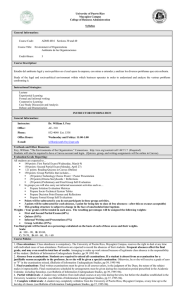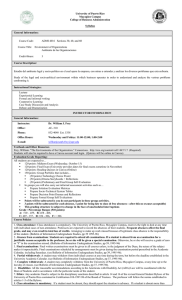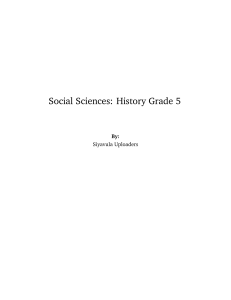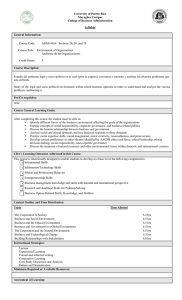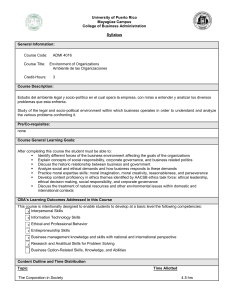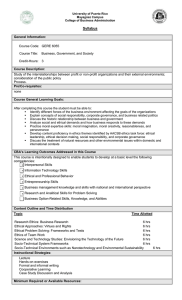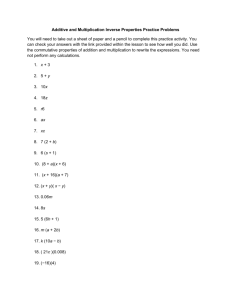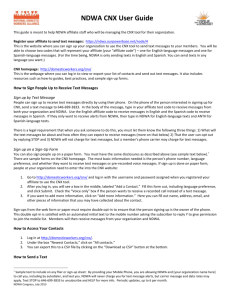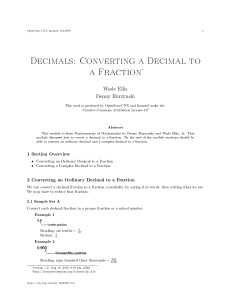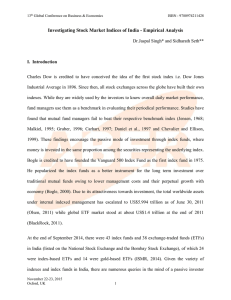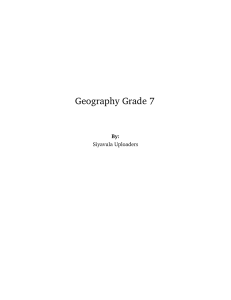ADMI4016_F13_short
advertisement
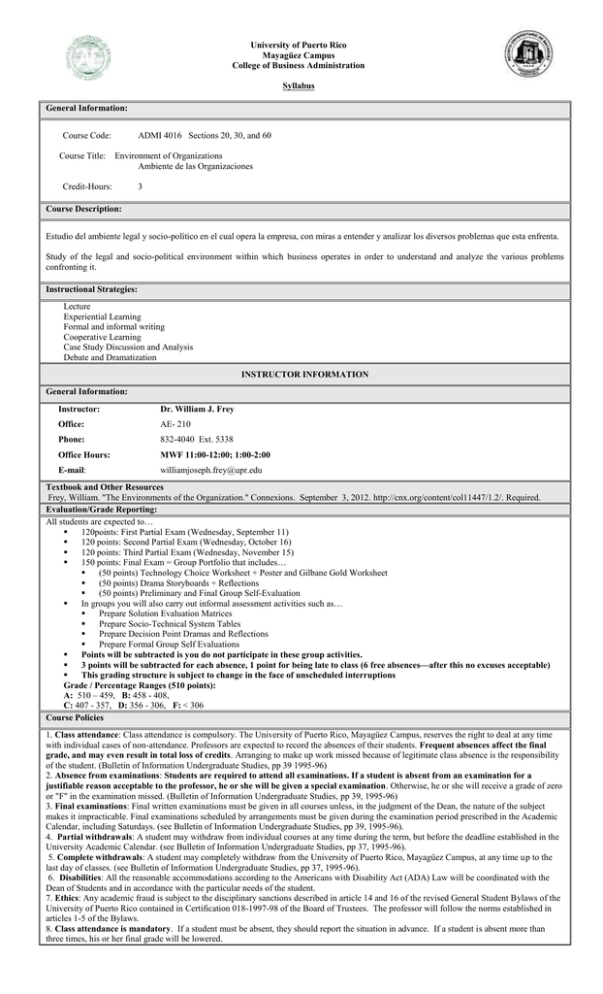
University of Puerto Rico Mayagüez Campus College of Business Administration Syllabus General Information: Course Code: Course Title: ADMI 4016 Sections 20, 30, and 60 Environment of Organizations Ambiente de las Organizaciones Credit-Hours: 3 Course Description: Estudio del ambiente legal y socio-político en el cual opera la empresa, con miras a entender y analizar los diversos problemas que esta enfrenta. Study of the legal and socio-political environment within which business operates in order to understand and analyze the various problems confronting it. Instructional Strategies: Lecture Experiential Learning Formal and informal writing Cooperative Learning Case Study Discussion and Analysis Debate and Dramatization INSTRUCTOR INFORMATION General Information: Instructor: Dr. William J. Frey Office: AE- 210 Phone: 832-4040 Ext. 5338 Office Hours: MWF 11:00-12:00; 1:00-2:00 E-mail: williamjoseph.frey@upr.edu Textbook and Other Resources Frey, William. "The Environments of the Organization." Connexions. September 3, 2012. http://cnx.org/content/col11447/1.2/. Required. Evaluation/Grade Reporting: All students are expected to… 120points: First Partial Exam (Wednesday, September 11) 120 points: Second Partial Exam (Wednesday, October 16) 120 points: Third Partial Exam (Wednesday, November 15) 150 points: Final Exam = Group Portfolio that includes… (50 points) Technology Choice Worksheet + Poster and Gilbane Gold Worksheet (50 points) Drama Storyboards + Reflections (50 points) Preliminary and Final Group Self-Evaluation In groups you will also carry out informal assessment activities such as… Prepare Solution Evaluation Matrices Prepare Socio-Technical System Tables Prepare Decision Point Dramas and Reflections Prepare Formal Group Self Evaluations Points will be subtracted is you do not participate in these group activities. 3 points will be subtracted for each absence, 1 point for being late to class (6 free absences—after this no excuses acceptable) This grading structure is subject to change in the face of unscheduled interruptions Grade / Percentage Ranges (510 points): A: 510 – 459, B: 458 - 408, C: 407 - 357, D: 356 - 306, F: < 306 Course Policies 1. Class attendance: Class attendance is compulsory. The University of Puerto Rico, Mayagüez Campus, reserves the right to deal at any time with individual cases of non-attendance. Professors are expected to record the absences of their students. Frequent absences affect the final grade, and may even result in total loss of credits. Arranging to make up work missed because of legitimate class absence is the responsibility of the student. (Bulletin of Information Undergraduate Studies, pp 39 1995-96) 2. Absence from examinations: Students are required to attend all examinations. If a student is absent from an examination for a justifiable reason acceptable to the professor, he or she will be given a special examination. Otherwise, he or she will receive a grade of zero or "F" in the examination missed. (Bulletin of Information Undergraduate Studies, pp 39, 1995-96) 3. Final examinations: Final written examinations must be given in all courses unless, in the judgment of the Dean, the nature of the subject makes it impracticable. Final examinations scheduled by arrangements must be given during the examination period prescribed in the Academic Calendar, including Saturdays. (see Bulletin of Information Undergraduate Studies, pp 39, 1995-96). 4. Partial withdrawals: A student may withdraw from individual courses at any time during the term, but before the deadline established in the University Academic Calendar. (see Bulletin of Information Undergraduate Studies, pp 37, 1995-96). 5. Complete withdrawals: A student may completely withdraw from the University of Puerto Rico, Mayagüez Campus, at any time up to the last day of classes. (see Bulletin of Information Undergraduate Studies, pp 37, 1995-96). 6. Disabilities: All the reasonable accommodations according to the Americans with Disability Act (ADA) Law will be coordinated with the Dean of Students and in accordance with the particular needs of the student. 7. Ethics: Any academic fraud is subject to the disciplinary sanctions described in article 14 and 16 of the revised General Student Bylaws of the University of Puerto Rico contained in Certification 018-1997-98 of the Board of Trustees. The professor will follow the norms established in articles 1-5 of the Bylaws. 8. Class attendance is mandatory. If a student must be absent, they should report the situation in advance. If a student is absent more than three times, his or her final grade will be lowered. 9. Academic Integrity: Students are expected to do their assignments individually, unless otherwise instructed. If a student submits for evaluation the work of others as his/her own, the student has committed plagiarism. Plagiarism is the appropriation of another person’s ideas, processes, results, or words without giving appropriate credit.” Fabrication and falsification will also not be tolerated. (Definition taken from RCR pamphlet, page 21 by Nicholas Steneck accessed at the following address on January 17, 2012. http://ori.hhs.gov/sites/default/files/rcrintro.pdf ) 10. Classroom environment will be oriented around values described in ADEM Statement of Values: Justice, Respect, Responsibility, Integrity, and Trust. Examples: participating actively in class activities (justice), maintaining a good attendance record (responsibility), collaborating with classmates (trust), maintaining high standards of academic excellence and honesty (integrity), and respecting one another’s rights (respect). Students are expected to come to class ready to work. Inappropriate behavior (private conversations, disrespectful behavior, academic misconduct) will not be tolerated. Course Outline and Schedule Classes 3 Topic Introduction to Class 4 The Ethical Environment (6 hours) Connexions Module Syllabus Mountain Terrorist Exercise http://cnx.org/content/m13764/1.11/ Basic Ethical Approaches Value-Based Decision Making in Gilbane Gold http://cnx.org/content/m15783/1.6/ Three Frameworks for Ethical Decision-Making http://cnx.org/content/m13757/1.23/ Read Kelly’s Cosmetic Surgery 4 6 1 4 7 Learning to work in small groups Toysmart First Partial Exam: Wed., September 11 Socio-Technical System as Environments of Business Appropriate technology and responsible technological choice Mega Weapons Case + Solution Evaluation Matrix Ethics of Team Work http://cnx.org/content/m13760/latest/ Toysmart Case Exercises – Student Module http://cnx.org/content/m14789/latest/ Values, pitfalls, and compromise practices Case narrative Informed Consent Presentations Economic, legal, and natural environments Responsible Choice for Appropriate Technology http://cnx.org/content/m43922/1.2/ Socio-Technical Systems in Professional DecisionMaking http://cnx.org/content/m14025/latest/ Theory Building Activities: Responsibility and Incident at Morales http://cnx.org/content/m15627/1.7/ Cases: Aprovecho Stoves, Amish technology, OLPC, airplane cockpits, Uchangi Dam, WFL Case Poster Session 1 Second Partial Exam: Wednesday, October 16 Statement of Value Challenge Multiple Choice / Matching Test (120 points) 4 Hughes Aircraft Case 1 Third Partial Exam: Friday November 15 Debates: Homo Economicus Corporate Moral Responsibility Corporate Social Responsibility Reflection and Closure: Final Activities: Due on Dec. 11 or day during which final exam is scheduled Case Analysis Module: Hughes Aircraft http://cnx.org/content/m13766/latest/ Dramatic Rehearsals Multiple Choice / Matching Test (120 points) 2 Socio-Technical Systems in Professional DecisionMaking http://cnx.org/content/m14025/latest/ Incident at Morales: Video 4 (If time) Problem solving framework Problem specification Solution generation Solution testing Solution implementation Solution Testing Framework Solution Implementation Framework Multiple Choice Test (120 points) 4 4 Activity Discussion of syllabus, Connexions access, and MTE. Characteristics of STSs STS Characteristics: Systems, components, value-laden, trajectories STS Tables SOV value profiles and root meanings Issuing conceptual challenges Confusing Values Prioritizing Values Case Narrative Responsible Dissent Dramatizations 1. A Short History of the Corporation http://cnx.org/content/m17314/1.3/ 2. Three Views of CSR http://cnx.org/content/m17318/ 3. Different Approaches to Corporate Governance http://cnx.org/content/m17367/1.5/ Ghoshal: “Bad Management Theories…” Velasquez: “Debunking Corporate Moral Responsibility” Werhane: “Mental Models, Moral Imagination, and System Thinking” Ethics of Team Work, Exercise 4 http://cnx.org/content/m13760/latest/ 1. Ethics of Team Work Closeout (during final exam period) 2. Gilbane Gold and Technological Choice Worksheets 3. Case Dramatizations, Storyboards and Reflections 150 points Course Evaluations (Instructor’s Evals) Statement of Values Collection http://cnx.org/content/col11467/1.1 Developing Ethics Codes and Statements of Value http://cnx.org/content/m14319/1.9/ Chapter 4

